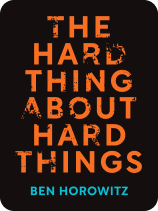

This article is an excerpt from the Shortform book guide to "The Hard Thing About Hard Things" by Ben Horowitz. Shortform has the world's best summaries and analyses of books you should be reading.
Like this article? Sign up for a free trial here .
Looking for The Hard Thing About Hard Things quotes? What can Ben Horowitz teach you about starting and owning a company?
Ben Horowitz’s book The Hard Thing About Hard Things is about how to get through the difficult times as a CEO or business owner. Sometimes you may feel like you don’t know what you’re doing or want to give up, but Horowitz says to keep pushing.
Keep reading for The Hard Thing About Hard Things quotes.
The Hard Thing About Hard Things Quotes
Ben Horowitz isn’t impressed with most business books. Most of what they discuss—setting audacious goals, constructing a winning strategy, building a cheerful culture—isn’t the hard part of building a company.
Most business books try to give a recipe for success, but “the hard thing about hard things” is that there is no recipe for those hard situations.
Below are the best The Hard Thing About Hard Things quotes:
“Every time I read a management or self-help book, I find myself saying, “That’s fine, but that wasn’t really the hard thing about the situation.” The hard thing isn’t setting a big, hairy, audacious goal. The hard thing is laying people off when you miss the big goal. The hard thing isn’t hiring great people. The hard thing is when those “great people” develop a sense of entitlement and start demanding unreasonable things. The hard thing isn’t setting up an organizational chart. The hard thing is getting people to communicate within the organization that you just designed. The hard thing isn’t dreaming big. The hard thing is waking up in the middle of the night in a cold sweat when the dream turns into a nightmare.”
Ben Horowitz isn’t impressed with most business books. Most of what they discuss—setting audacious goals, constructing a winning strategy, building a cheerful culture—isn’t the hard part of building a company. The hard part is firing your friends when they no longer fit your company’s goals, it’s staring at impending bankruptcy and throwing your Hail Mary to save the company.
Most business books try to give a recipe for success, but “the hard thing about hard things” is that there is no recipe for those hard situations. This book is a collection of advice and first-hand experiences to help company operators deal with the hard times.
“Take care of the people, the products, and the profits-in that order.”
Take care of the people, and the products and profits will follow. If you reverse the priorities, you’ll end up with a miserable workplace and possibly sabotage your success.
You can best take care of your people by making your company a good place to work. In Horowitz’s terms, in a good place to work:
- People are clear on what their jobs are and how success is measured.
- People believe their work makes a difference to the success of the company and, by extension, to their personal success.
- They have as few barriers to getting work done as possible. A good work environment avoids office politics, infighting, and overly bureaucratic processes, which all get in the way of doing good work.
- People enjoy working with the people around them. They don’t always have to like each other personally, but they respect that everyone is pulling their weight.
A poor place to work inverts all of these. People aren’t clear what their jobs are; they don’t know if their work means anything; their work gets stymied by dumb obstacles; and people despise whom they work with.
“People at McDonald’s get trained for their positions, but people with far more complicated jobs don’t. It makes no sense. Would you want to stand on the line of the untrained person at McDonald’s? Would you want to use the software written by the engineer who was never told how the rest of the code worked? A lot of companies think their employees are so smart that they require no training. That’s silly.”
Training is one of the most valuable activities a company can do. It is wonderfully high-leverage—each person spends 2,000 hours per year working for your company. Say you spend ten hours to train a group of ten people, who collectively work 20,000 hours per year; if you improve their performance by 1%, you have converted 10 hours of your time into 200 hours of extra team productivity.
Many companies think that since they hire such smart people, training isn’t necessary, that they’ll figure it out themselves. This is woefully misguided and a wasted opportunity. Companies also think that they don’t have time for training, but this is also short-sighted. Training is the very thing that makes people productive, so it is the first thing to prioritize.
“Great CEOs face the pain. They deal with the sleepless nights, the cold sweats, and what my friend the great Alfred Chuang (legendary cofounder and CEO of BEA Systems) calls “the torture.” Whenever I meet a successful CEO, I ask them how they did it. Mediocre CEOs point to their brilliant strategic moves or their intuitive business sense or a variety of other self-congratulatory explanations. The great CEOs tend to be remarkably consistent in their answers. They all say, ‘I didn’t quit.'”
Despite being in the struggle, you must never give up. The only certain way you’ll fail is if you give up. When you see no good moves, you have to keep looking for a move.
Ben doesn’t like thinking about the statistics of the situation—that there might be a one in a hundred chance of things working and a 99% chance of failure. The odds don’t matter to him—there is an answer to your problems out there, and your job is to find it.
Great CEOs push through the pain.
“Life is struggle.” I believe that within that quote lies the most important lesson in entrepreneurship: Embrace the struggle.”
Ben gives a reminder that building a company will be a struggle. But greatness is created through the struggle. And if you endure the struggle and trust your ability to overcome it, you may just make your dreams real.

———End of Preview———
Like what you just read? Read the rest of the world's best book summary and analysis of Ben Horowitz's "The Hard Thing About Hard Things" at Shortform .
Here's what you'll find in our full The Hard Thing About Hard Things summary :
- What it was like to head a company through the dotcom bubble and subsequent burst
- Why failing is normal
- How to build a good place to work






